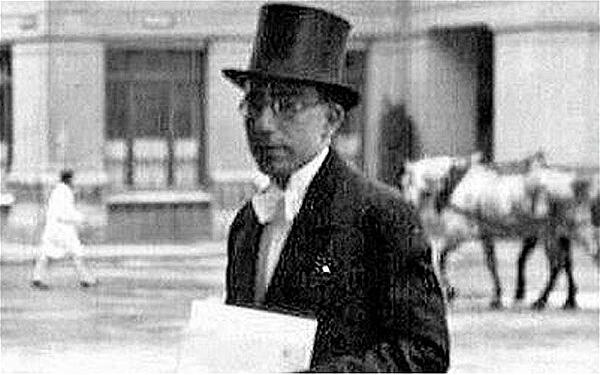Abdol-Hossein Sardari
Often hailed as an unsung hero of World War Two, Abdol-Hossein Sardari was an Iranian statesman who saved the lives of thousands of Iranian Jews by helping them to escape German occupied France. Once he realised the full extent of Nazi ambitions, he issued hundreds of Iranian passports to non-Iranian Jews.
Born in 1885, Abdol-Hossein Sardari was a member of the Qajar royal family. He had a privileged childhood, however, in 1925, his family lost control of the country meaning that he now had to earn his own living. Sardari decided to travel to Switzerland where he studied law at Geneva University. He graduated with his law degree in 1936 and Sardari then went on to become an Iranian diploma in Paris in 1940. When the Nazis invaded Paris, the majority of Sardari’s colleagues in the embassy moved to the safety of Vichy in France, but he remained in Paris.
In the middle of the 20th century Paris had a small but tight-knit Jewish community. Needless to say, once the Germans took control of France these Jews feared for their life; one survivor from the time, Eliane Senahi Cohanim, who was helped by Sardari, simple stated: “It was scary. It was very, very scary.”

Leaving France was not simple for the Iranian Jews, and most important they required a valid passport, which had to come from the Diplomatic Mission, which is where Sardari worked.
Sardari has often been referred to as the Iranian Oskar Schindler because of the work he did to save the lives of many Jewish Iranian families. In fact, it is estimated that around 1,000 Iranian Jewish families escaped the clutches of the Nazis because Sardari had provided them with the necessary documentation.
As the war progressed Sardari’s position became even more complicated. While Iran had begun the war as a neutral, as things developed the Tehran government slowly started to build up a trading relationship with Nazi Germany. As such, it was extremely risky for Sardari to send Jews to Iran as if Iran was found to be protecting Jews it would destroy the relationship between the two nations.
But the Jews in Paris were at high risk. As they did in all the countries they invaded, the Nazi quickly set about identifying, rounding up and either imprisoning or killing the Jews in that area. Fearing the worst, many Jews had fled Paris before the German invasion, but those who stayed behind were marked out - as they were in other countries - with the Star of David badge sewn onto their clothes. As the Nazis began to round up Jews and take them to transit camps desperation set in.
This is when Sardari’s work truly began as he made use of his political position and influence to get as many Iranian Jews as possible out of France. Sardari’s argument was that the Iranian Jews, in terms of their bloodline, shared no connection with the European Jews that Hitler wanted to wipe out, and this should be spared the same treatment. He purportedly but this argument across that many of the senior Nazis in Berlin came on board with his view.
However, as well as attempting to spare them the same persecution, Sardari knew the best option was to get as many of them as he could out of the county, so he ordered as many new-style passports as was possible. It is hard to state exactly how many people he helped, but estimates suggest that as many as 2,000 people, including many children, were saved by his actions.
Sardari’s work remained largely unknown even after World War Two ended, with the focus on the 6 millions Jews who lost their lives, thus making the 2,000 Iranian Jews who escaped Paris seem almost trivial.
The end of the war did not signal the start of a normal or easier life for Sardari though; in 1952 he was ordered to return to Tehran where the authorities charged him with misconduct and embezzlement over his giving out of passports to help the Iranian Jews escape France. It was not until 1955 that he was finally able to clear his name and then when he took the decision to retire from the Iranian Diplomatic Corps Sardari made a new home for himself in London.
But his retirement would not be a happy one; in 1978 the Iranian Revolution took place which saw the overthrowing of Peacock Throne. Sardari, as a result, lost everything, including the property he owned in Iran and much of the finances he had been falling back on now he was retired.
In 1981 Abdol-Hossein Sardari died. He had spent the final three years of his life since losing all his money living in a small bedsit in Croydon. It was only in 1984 that his helping of the Iranian Jews gained official recognition - the Simon Wiesenthal Centre in Los Angeles paid tribute to his humanitarian work in France during World War Two.
See also: Jewish Revenge Squads
MLA Citation/Reference
"Abdol-Hossein Sardari". HistoryLearning.com. 2026. Web.
Key facts
| Name: | Abdol-Hossein Sardari |
| Birth Date: | 1895, |
| Death: | 1981, |
| Occupation: | Iranian stateman |
| Known for: | Saving the lives of up to 2,000 Iranian Jews in France by issuing Iranian passports |
